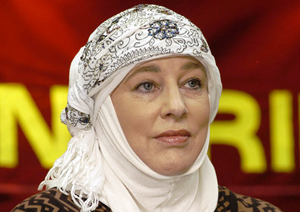I have no idea where the Islamic State/ISIS/ISIL or whatever name it uses came from, and I'm just as baffled by the roots of its violent ideology.  While I never pretend to speak for the diverse community of Muslims living in Britain today, I reckon my views on this will be echoed by the majority who have watched with growing concern the unprecedented rise of this group.
While I never pretend to speak for the diverse community of Muslims living in Britain today, I reckon my views on this will be echoed by the majority who have watched with growing concern the unprecedented rise of this group.
However, just as unprecedented is the childish invective being spewed out by Islamophobes, racists and so-called terrorism experts encouraged by some sections of the British media. They have not helped at all.
While I've blocked most of the jack-booted trolls who patrol Twitterland demanding that anyone who is or even looks like a Muslim should launch an immediate protest march against ISIS, I'm amazed that similar rhetoric is being pushed by elements of the media.
There are many reasons why I've not spoken out against ISIS. For a start, I'm not sure who it is, where it came from or how it is funded. I've not seen such a militarily- and strategically-savvy fighting force emerge in the Middle East before, other than the highly disciplined and much feared Hezbollah. I, like many others, want to know a little bit more about ISIS before making public comments.
Secondly, why should I organise a march against ISIS? I am not responsible for its actions, just as my Jewish friends are not responsible – and nor should they be - for the actions of that other group of violent psychos in the Middle East, the Israeli military. While ISIS enforcers wield head- and limb-chopping knives, Israel drops bombs called Daisy Cutters which also decapitate and maim anyone caught in the fallout.
Thirdly, my silence over ISIS does not mean that I support the group even if some fools take my silence as a sign that I do. Only when I ask some male tweeters to apologise on behalf of rapists, on the grounds that every rapist is a man so they must all be somehow culpable, does the penny drop; occasionally I'll get a muffled apology.
And finally, even if I jumped up and down and declared that "ISIS is the scum of the earth", exactly what would that achieve anyway? I hardly think its leader Abu Bakr Al-Baghdadi is going to lose any sleep over Yvonne Ridley's views.
There are few certainties in the chaos that is now the Middle East. However, what I can say with authority is that the world would never have heard of ISIS had widow-makers George W Bush and Tony Blair not launched their illegal war in Iraq in 2003. The world would also never have seen ISIS develop into the full blown monster that it is if the West had, at the very least, introduced a no-fly zone in Syria after the chemical weapons were unleashed on civilians by Bashar Al-Assad's forces exactly a year ago this week.
The question to ask is this: Who really benefits from the unfolding ISIS spectacle? The big winners are sitting within the Assad regime. It is that regime which was, by the way, suspected of capturing US journalist James Foley who went missing in north-west Syria on 12 November 2012. How on earth did he slip out of the Syrian government's hands into those of the murderous head-chopping maniacs of ISIS?
The former head of the British Army says that the West should sit down and negotiate with Assad to get rid of ISIS, but what if ISIS was created by Assad and his ally Iran, which has members of the elite Republican Guard in parts of Syria?
As crazy as it sounds, that would explain why Nouri Al-Maliki's Iraqi army fell away so easily in the face of ISIS leaving behind a massive arsenal of weapons for the militia to use. It is virtually inconceivable for a trained fighting force to leave all of its kit behind before doing a runner, just as it's virtually inconceivable that a crack fighting force like ISIS could emerge from a rag tag bunch of ill-disciplined rebel fighters buoyed-up by disaffected youngsters from Europe and beyond.
Make no mistake, ISIS's domination of Iraq is nothing short of breath-taking; it has achieved in a matter of weeks what the US and its allies failed to do in 10 years of occupation. This hasn't happened by accident; military victories on this scale take strategic planning and inside help. So who, exactly, is behind ISIS?





Comments
Add new comment